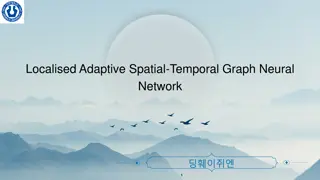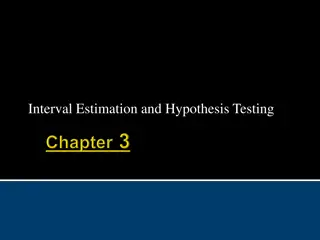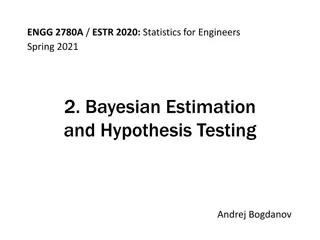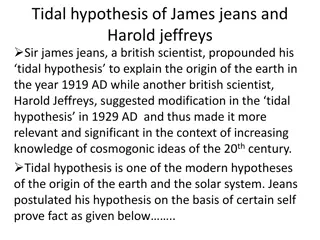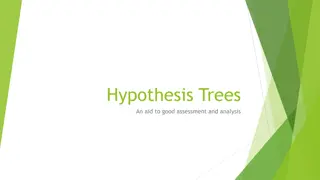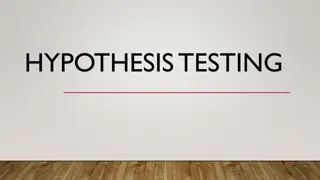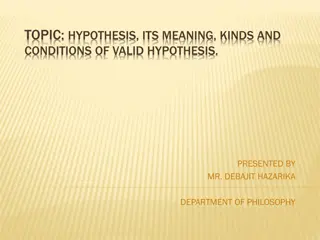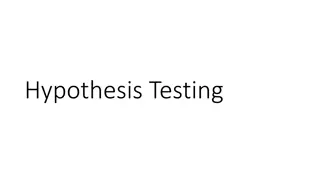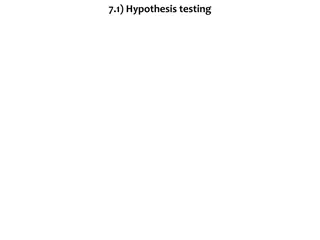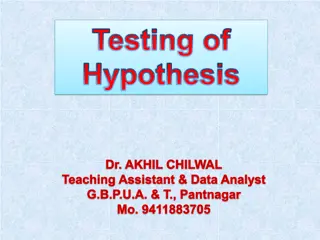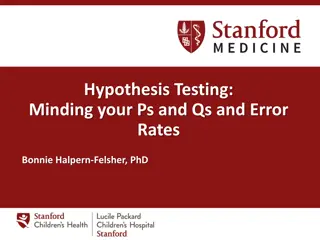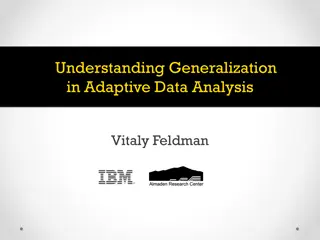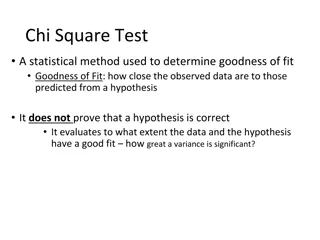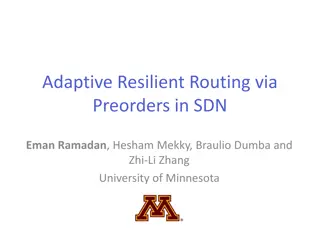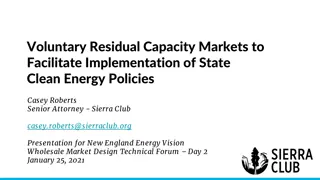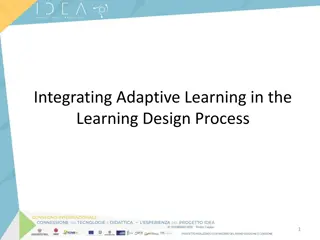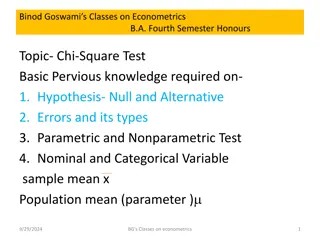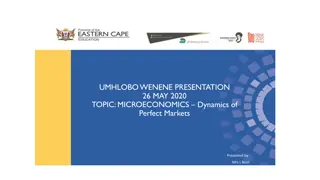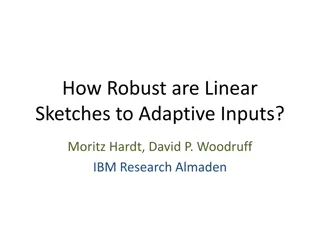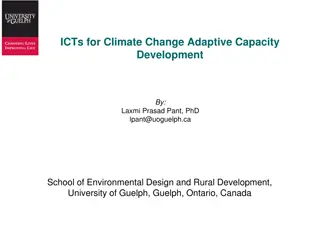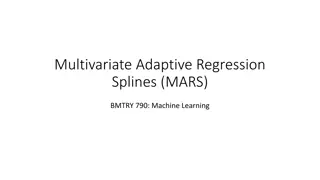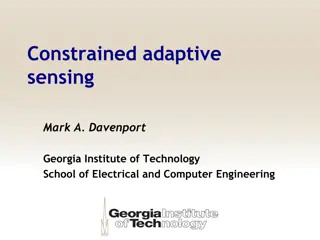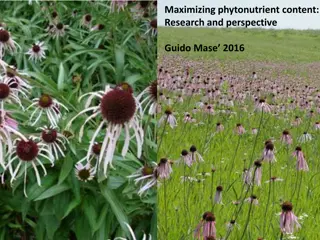Understanding Financial Markets in India
Financial markets play a crucial role in connecting lenders and borrowers, providing avenues for investment and capital generation. In India, the financial system includes money markets and capital markets, offering diverse financial products and opportunities for investors. Money markets deal with
2 views • 106 slides
Localised Adaptive Spatial-Temporal Graph Neural Network
This paper introduces the Localised Adaptive Spatial-Temporal Graph Neural Network model, focusing on the importance of spatial-temporal data modeling in graph structures. The challenges of balancing spatial and temporal dependencies for accurate inference are addressed, along with the use of distri
3 views • 19 slides
Understanding Interval Estimation and Hypothesis Testing in Statistics
The concept of interval estimation and hypothesis testing in statistics involves techniques such as constructing interval estimators, performing hypothesis tests, determining critical values from t-distributions, and making probability statements. Assumptions must be met in linear regression models
0 views • 25 slides
Bayesian Estimation and Hypothesis Testing in Statistics for Engineers
In this course on Bayesian Estimation and Hypothesis Testing for Engineers, various concepts such as point estimation, conditional expectation, Maximum a posteriori estimator, hypothesis testing, and error analysis are covered. Topics include turning conditional PDF/PMF estimates into one number, es
1 views • 16 slides
Understanding Markets and Economic Structures
Markets play a crucial role in bringing buyers and sellers together for transactions. This article discusses the concept of markets, different types of markets in a capitalist economy, focusing on perfect competition. It outlines the features and conditions of perfect competition, emphasizing the im
2 views • 42 slides
The Tidal Hypothesis of James Jeans and Harold Jeffreys: Origin of the Earth
The Tidal Hypothesis proposed by British scientists James Jeans and Harold Jeffreys in the early 20th century suggested that the Earth and solar system were formed from the interaction of the Sun and an intruding star. Jeans postulated that massive gravitational forces from the intruding star caused
2 views • 5 slides
Understanding Hypothesis Trees for Effective Assessment and Analysis
Hypothesis trees offer a structured approach to analysis by identifying problems, potential causes, testing hypotheses, and reaching conclusions. They enhance evidence gathering and ensure the child's perspective is central in assessments. Utilizing stages like problem identification, cause analysis
1 views • 11 slides
Understanding Type I and Type II Errors in Hypothesis Testing
In statistics, Type I error is a false positive conclusion, while Type II error is a false negative conclusion. Type I error occurs when the null hypothesis is incorrectly rejected, leading to a conclusion that results are statistically significant when they are not. On the other hand, Type II error
0 views • 6 slides
Understanding Hypothesis: Meaning, Types, and Validity Conditions
A hypothesis is a provisional supposition used to explain a fact or phenomenon, serving as a starting point in investigations to establish causal connections. This article explores the meaning of hypothesis, different types, conditions for validity, and examples. Definitions by prominent philosopher
0 views • 22 slides
Understanding Hypothesis Testing and Null vs. Alternative Hypotheses
A hypothesis is a prediction about a study's outcome, guiding research direction. Stating hypotheses forces deep thinking and making specific predictions but may introduce bias. Null hypothesis (H0) states no effect, while alternative hypothesis (Ha) claims an effect in the population. Researchers e
0 views • 7 slides
Hypothesis Testing Examples and Scenarios
Explore various scenarios involving hypothesis testing, including coin bias, dice rolling, and election candidate support estimation. Learn to define test statistics, null and alternative hypotheses, select significance levels, and determine conditions for rejecting the null hypothesis based on samp
0 views • 9 slides
Understanding Hypothesis Testing in Statistical Analysis
Statistical analysis aims to make inferences about populations based on sample data. Hypothesis testing is a crucial aspect where decisions are made regarding accepting or rejecting specific values or parameters. Statistical and parametric hypotheses, null hypotheses, and decision problems are key c
1 views • 34 slides
Understanding the Importance of Money Markets and Bond Markets
Money markets play a crucial role in the financial system by providing short-term, low-risk, and liquid investment options. Participants include institutional investors and dealers who engage in large transactions. Money market securities have specific characteristics, such as large denominations, l
0 views • 23 slides
Understanding Hypothesis Testing in Statistics
Hypothesis testing is essential in scientific inquiry, involving the formulation of null and alternative hypotheses at a chosen level of significance. Statistical hypotheses focus on population characteristics and are tested on samples using probability concepts. The null hypothesis assumes no effec
0 views • 26 slides
Understanding Generalization in Adaptive Data Analysis by Vitaly Feldman
Adaptive data analysis involves techniques such as statistical inference, model complexity, stability, and generalization guarantees. It focuses on sequentially analyzing data with steps like exploratory analysis, feature selection, and model tuning. The approach emphasizes on avoiding hypothesis te
0 views • 25 slides
Understanding Efficient Markets Hypothesis in Corporate Finance
Explore the concepts of efficient markets hypothesis (EMH) and adaptive markets hypothesis (AMH) in corporate finance. EMH posits that all information is instantly reflected in stock prices, while AMH suggests a gradual process based on the number of analysts. Learn about different forms of market e
0 views • 33 slides
Understanding Chi-Square Test for Goodness of Fit
Chi-square test is a statistical method used to assess how well observed data match the predicted values from a hypothesis. It does not confirm the hypothesis but measures the extent of fit between data and the hypothesis. This test is crucial for determining the significance of differences between
0 views • 10 slides
Understanding Hypothesis Testing in Statistics
Explore the concept of hypothesis testing through an engaging scenario involving Edison light bulbs. Learn about factors influencing hypothesis testing such as variability, sample size, and sample mean. Discover the logic behind hypothesis testing using Jake's napkin dispensers example. Enhance your
0 views • 28 slides
Understanding Hypothesis Testing in Statistics
Hypothesis testing is a fundamental concept in statistics that involves testing statements about population parameters. This content covers the basics of hypothesis testing, including types of hypotheses, examples, and the procedure involved in statistical hypothesis testing. It also explores the im
0 views • 23 slides
Understanding Hypothesis Testing in Statistics
This content discusses the fundamentals of hypothesis testing based on a single sample in statistics. It covers the assumptions for inference, the parts of a hypothesis test, statistical hypotheses, and provides examples of hypothesis tests and significance tests in practical scenarios. The importan
0 views • 69 slides
Optical Fiber Calibration System & Adaptive Power Supply by J. Cvach
Introduction to an optical fiber calibration system and adaptive power supply developed by J. Cvach from the Institute of Physics, ASCR, Prague. The system includes an LED driver, notched fibers, and adaptive power supply for various applications, such as the calibration of the CALICE AHCAL and LHCb
0 views • 13 slides
Adaptive Resilient Routing via Preorders in SDN
This research paper discusses the challenges of path-based routing in modern networks and introduces a novel approach called Adaptive Resilient Routing via Preorders in Software-Defined Networking (SDN). The authors emphasize the limitations of traditional routing schemes, the importance of resilien
0 views • 42 slides
Implementing Voluntary Residual Capacity Markets for Clean Energy Policies
Explore the concept of voluntary residual capacity markets to support the implementation of state clean energy policies. Learn how these markets allow load-serving entities to meet capacity obligations outside traditional markets, respecting state goals and methods. Discover the workings and design
0 views • 9 slides
Enhancing Learning Design with Adaptive Learning Solutions
Explore the integration of adaptive learning in educational design processes to address common challenges such as high drop-out rates and student disengagement. Discover key players in learning design and the benefits of intelligent adaptive learning systems in catering to individual student needs e
0 views • 56 slides
Understanding Horticulture and Agriculture: Adaptive Strategies in Human History
This article delves into the development of adaptive mechanisms in human history, focusing on horticulture and agriculture as key strategies. It explains the differences between horticulture and agriculture, explores the concept of cultivation continuum, and discusses pastoralism as an adaptive stra
0 views • 13 slides
Understanding Hypothesis Testing and Types of Errors in Econometrics
Hypothesis testing is vital in econometrics to evaluate statements about population parameters. The null hypothesis assumes no difference, while the alternative hypothesis offers a different perspective. Different types of errors—such as Type I and Type II errors—can occur during hypothesis test
1 views • 11 slides
Understanding Money Markets and Their Role in the Economy
Money markets are financial markets where short-term, low-risk securities are traded. Unlike banks, they offer distinct advantages such as liquidity, active secondary markets, and cost efficiency in providing short-term funds due to lower regulations. Despite the presence of banks, money markets pla
0 views • 33 slides
Evaluating Adaptive Attacks on Adversarial Example Defenses
This content discusses the challenges in properly evaluating defenses against adversarial examples, highlighting the importance of adaptive evaluation methods. While consensus on strong evaluation standards is noted, many defenses are still found to be vulnerable. The work presents 13 case studies o
0 views • 9 slides
Understanding Dynamics of Perfect Markets in Microeconomics
Explore the dynamics of perfect markets in microeconomics through this presentation by Mrs. L. Booi. Learn about the short and long run production, cost and revenue curves, and the concepts of perfect markets and imperfect markets. Gain insights into how things behave and affect other markets in the
0 views • 23 slides
Understanding Financial Markets: Mechanisms and Efficiency
Financial markets play a crucial role in connecting borrowers and lenders, facilitating the flow of funds for optimal allocation. Different financial phases involve borrowing, saving, and investing. Transfers of funds occur directly or through intermediaries. Efficiency in financial markets ensures
0 views • 15 slides
Robustness of Linear Sketches to Adaptive Inputs in Big Data Processing
Exploring the robustness of linear sketches in handling adaptive inputs in big data scenarios. The study covers applications like compressed sensing, data streams, and distributed computation. It delves into the challenges posed by adaptive inputs and the implications for correctness and efficiency
0 views • 27 slides
Explore Adaptive Recreation and Sports for Individuals with Disabilities
Discover adaptive recreation opportunities for individuals with disabilities, including winter and summer activities such as skiing, biking, kayaking, and rock climbing. Learn about the mission of providing inclusive leisure options and find volunteer opportunities with organizations like High Count
0 views • 8 slides
Enhancing Climate Change Adaptive Capacity Through ICTs
Developing adaptive capacity to address climate change in vulnerable communities is crucial. Integrating expert and local knowledge using Information and Communication Technologies (ICTs) can help, but challenges like digital exclusion must be overcome. Understanding climate change as a complex prob
0 views • 12 slides
Multivariate Adaptive Regression Splines (MARS) in Machine Learning
Multivariate Adaptive Regression Splines (MARS) offer a flexible approach in machine learning by combining features of linear regression, non-linear regression, and basis expansions. Unlike traditional models, MARS makes no assumptions about the underlying functional relationship, leading to improve
0 views • 42 slides
Understanding International Finance: Scope, Importance, and Challenges
International finance explores interactions between countries, including currency exchange rates, foreign direct investment, and risk management. The scope includes foreign exchange markets, MNC financial systems, and international accounting. It raises questions on liberalizing financial markets, I
0 views • 52 slides
Understanding Hypothesis Testing in Statistics
This content explores the concept of hypothesis testing in statistics, covering the procedures, general research questions, examples, and hypothesis design. It explains the formulation of hypotheses, decision criteria, significance levels, and the importance of testing population parameters. Various
1 views • 97 slides
Constrained Adaptive Sensing and Benefits of Adaptivity
Constrained adaptive sensing involves estimating sparse signals with constraints, utilizing strategies like nonadaptive sensing and adaptive sensing. Benefits of adaptivity include reducing errors and improving estimation accuracy in signal processing. It explores the potential for improvement in re
0 views • 17 slides
Understanding Human Adaptive Strategies: A Historical Perspective
Humans have utilized various adaptive strategies throughout history to survive and secure a livelihood, including hunting-gathering, horticulture, pastoralism, etc. This session introduces these strategies, their characteristics, and why they persist in modern times. The discussion also covers the h
0 views • 11 slides
Understanding Plant Chemistry and Phytonutrients: Insights from Research
Exploring the diverse world of plant chemistry, this content delves into primary and secondary metabolites, highlighting the significance of phytonutrients in maximizing nutritional content. Various hypotheses such as the Insecticide Hypothesis and Co-evolution Hypothesis are discussed, shedding lig
0 views • 61 slides
Understanding the Kinked Demand Curve Hypothesis in Oligopoly Markets
In oligopoly markets, prices often remain rigid despite cost changes. The kinked demand curve hypothesis, introduced by economist Sweezy, explains this phenomenon. It suggests that the demand curve an oligopolist faces has a kink at the current price level, with elastic demand above and inelastic de
0 views • 4 slides

